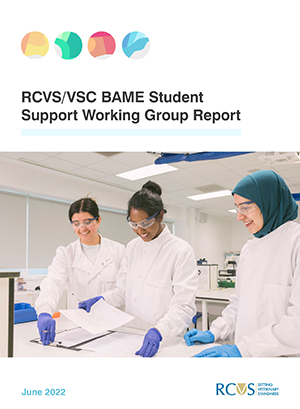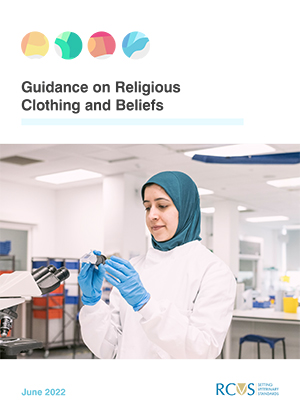Recommendations on improving support for BAME students at university published
23 June 2022
The RCVS and the Veterinary Schools Council (VSC) have published a joint report with recommendations on how support for Black, Asian and minority ethnic (BAME) veterinary students can be improved, as well as a template guidance document on accommodating religious clothing and beliefs in veterinary education and clinical settings.
 The Report was published on Thursday 23 June 2022 and is the culmination of the work of a joint RCVS and VSC BAME Student Support Working Group, set up to explore key issues in supporting BAME veterinary students during their studies, to share current good practice, and make further recommendations to improve the experience of BAME students.
The Report was published on Thursday 23 June 2022 and is the culmination of the work of a joint RCVS and VSC BAME Student Support Working Group, set up to explore key issues in supporting BAME veterinary students during their studies, to share current good practice, and make further recommendations to improve the experience of BAME students.
The Working Group comprised BAME student and staff representatives from UK vet schools, as well as representatives of the RCVS Diversity and Inclusion Group and the Vet Schools Council. This working group grew out of virtual roundtable events held in the autumn of 2020 to discuss the barriers to providing support for BAME veterinary students.
At the outset the key areas of focus for the Working Group were: developing clear discrimination reporting structures, particularly for students on extra-mural studies (EMS) placements; developing and supporting a group of role models within the vet schools amongst both students and faculty; and, developing support structures for BAME students. The development of religious clothing guidance for universities and placement hosts was also added to the remit of the Working Group before its first meeting.
As a result of four meetings of the Working Group over a four-month period, 14 recommendations have been made in the final report, including:
- developing formal support and guidance documents for students going on placement and developing formal discrimination reporting mechanisms for students;
- ensuring all staff and students are aware of the new RCVS Accreditation Standards in relation to equality, diversity and inclusion (EDI) in teaching and placement settings;
- providing guidance and training to university staff on handling discrimination complaints;
- providing EDI training to university staff, students and placement providers to improve awareness of equality legislation – including rights and responsibilities – as well as other key concepts in EDI, such as micro-aggressions;
- resource, support and collaborate with BAME student groups and societies to better understand experiences;
- improve the visibility of BAME role models to create a more inclusive and positive educational experience for BAME students;
- provide access to support and advice for BAME students through internal and external mentoring initiatives;
- review and adapt the guidance on religious clothing and belief for use within local settings.
Stephanie-Rae Flicker is a recent Royal Veterinary College (RVC) graduate who co-chaired the Working Group alongside Professor Rob Pettitt from the University of Liverpool. Speaking of the recommendations she said: “It has been a privilege to contribute to the VSC and RCVS BAME Student Working Group in the last year. Collectively, our members have been able to reflect on experiences of under-represented students within our profession and produce recommendations for improvements in this Report.
“I hope this encourages and supports our veterinary institutions to actively implement change regarding discrimination faced during studies and placements, nurturing role models and helping affected students develop sense of belonging and community during their studies and beyond. Many thanks to all that have contributed to the completion of this Report – we hope the recommendations have a lasting impact, and benefit those both already present and yet to enter our profession."
Professor Pettitt added: “I, and the rest of the team, am immensely proud of this report that is the result of many hours of hard work from many people; I cannot thank them all enough. It is however important to state that this is just the first stage and VSC will work hard to deliver the recommendations that have come from this report to ensure that everyone in the profession can work in a supported and safe manner no matter what.”
 The Guidance on Religious Clothing and Beliefs has been published as a separate document from the main report and is intended to act as a template that can be adopted and used by vet schools, EMS placement providers, other veterinary educational establishments and any veterinary organisation. The document covers issues such as: balancing accommodations for religious dress with clinical considerations; and making accommodations for religious observance in academic timetabling and exams.
The Guidance on Religious Clothing and Beliefs has been published as a separate document from the main report and is intended to act as a template that can be adopted and used by vet schools, EMS placement providers, other veterinary educational establishments and any veterinary organisation. The document covers issues such as: balancing accommodations for religious dress with clinical considerations; and making accommodations for religious observance in academic timetabling and exams.
Talking about the religious clothing and beliefs guidance document, Gurpreet Gill, RCVS Leadership and Inclusion Manager, commented: “We are grateful to Liverpool Vet School for developing the guidance on religious clothing and beliefs which we have adapted into this template document, as well as to the University of Surrey and its students for the report and guidance document photography.
“This document is about recognising that personal religious beliefs should be respected and accommodated as far as possible, while also not compromising professional responsibilities such as infection control, effective communication and the health and safety of individuals and their colleagues. Most importantly, it is about creating a welcoming and inclusive environment and ensuring that all students are able to express their religious identity whilst participating in educational and workplace settings.
“Although the guidance is not exhaustive, we would highly recommend that, where relevant, educators, practices and other veterinary workplaces review, adopt and adapt this guidance for their own settings to ensure that all members of the professions are welcomed and included.”
Both the RCVS/VSC BAME Student Support Working Group Report and the Guidance on Religious Clothing are available to download from the RCVS Publications webpage.